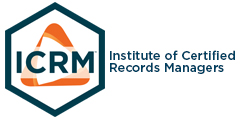Part 1 Test Questions
PART 1 – MANAGEMENT PRINCIPLES AND THE RECORDS AND INFORMATION MANAGEMENT (RIM) PROGRAM
Part 1 includes topics such as staffing, budgeting, cost analysis and control, organizational placement, authority and scope of a program, management theories, ethical obligations and global concerns. The Annotated Outline provides detailed information about the content of Part 1.
Part 1 – Sample Questions
- INTRO POLL QUESTIONS/ANSWERS
1. The management function concerned with assigning tasks to various individuals or groups within the organization is:
- planning.
- organizing.
- controlling.
- prioritizing.
- influencing.
2. _____ was considered the “father of scientific management”.
- Fayol
- Hawthorne
- Drucker
- Taylor
- Katz
3. _____ includes motivating employees, directing the activities of others, selecting the most effective communications channel, and resolving conflicts.
- Controlling
- Leading
- Planning
- Disciplining
- Promoting
4. All managers, regardless of level, make:
- decisions.
- money.
- differences.
- profits.
- policy.
5. All individuals and groups that are directly or indirectly affected by an organization’s decisions are its:
- stockholders
- investors
- employees
- stakeholders
- external constituencies
6. The last step in the planning process is to:
- choose the best alternative for reaching objectives.
- develop premises upon which each alternative is based.
- state organizational objectives
- put the plans into action.
- develop a budget.
7. Which scheduling tool is normally used to schedule production inputs such as human resources and machinery?
- SWOT analysis
- PERT diagrams
- Gantt charts
- workflow diagrams
- planning sheets
8. The _____ of an organization is represented primarily by the organization chart.
- profit formula
- enhancement
- work output
- bureaucracy
- formal structure
9. The process of assigning job activities and related authority to specific individuals in the organization is:
- accountability.
- delegation.
- responsibility.
- authority.
- decentralization.
10. Organizations are considered _____ if they exchange goods and services with consumers in other countries.
- global
- bureaucratic
- multicultural
- partners
- parochial
- FINAL ASSESSMENT POLL QUESTIONS AND ANSWERS
11. Employee training involves changing skills, knowledge, attitudes or:
- compensation.
- job descriptions.
- behavior.
- locations.
- schedules.
12. The process of locating, identifying, and attracting capable applicants for a job is:
- training.
- evaluation.
- attrition.
- recruitment.
- validation.
13. _____ refers to creating and maintaining beneficial relationships with others to accomplish your goals
- Mentoring
- Marketing
- Team building
- Social media
- Networking
14. To compute the records retrieval efficiency ratio:
- Divide the number of records located by the amount of time it took to retrieve them.
- Divide the time required to locate records by the number of records requested.
- Multiply the number of records requested by the number of records found.
- Add the number of duplicate records to the number of records found.
- Divide the number of records requested by the amount of time to locate them.
15. _____ are typically designated by the business unit within an organization to serve as a liaison with the RIM program.
- IT staff
- Records coordinators
- Legal representatives
- Auditors
- Marketing personnel
16. A(an) _____ budget is money a company plans to spend to either purchase a fixed asset or to extend its useful life.
- zero-based
- revenue
- income
- capital outlay
- balanced building
17. A(an) _____ mandates guidelines for managing records within an organization.
- procedure
- task list
- schedule
- hold order
- policy
18. Records management audits should cover records and records systems, appraisal, records controls, processes for creating, capturing, and managing records and:
- policies and responsibilities.
- IT security.
- budgets.
- metadata.
- staffing.
19. Records management program _____ are systematic studies conducted to assess how well a program or operation is working.
- reviews
- audits
- inventories
- communications
- policies
20. An achievement test measures the potential of an individual to:
- follow disciplinary procedures.
- perform a task.
- draw a paycheck.
- meet performance standards.
- administer a training program.
NOTE: For authorized presenter use during ICRM Virtual Exam Prep Workshop Series ONLY, Distribution Prohibited.
Answers:
- B
- D
- B
- A
- D
- D
- C
- E
- B
- A
- C
- D
- E
- B
- B
- D
- E
- A
- B
- B
